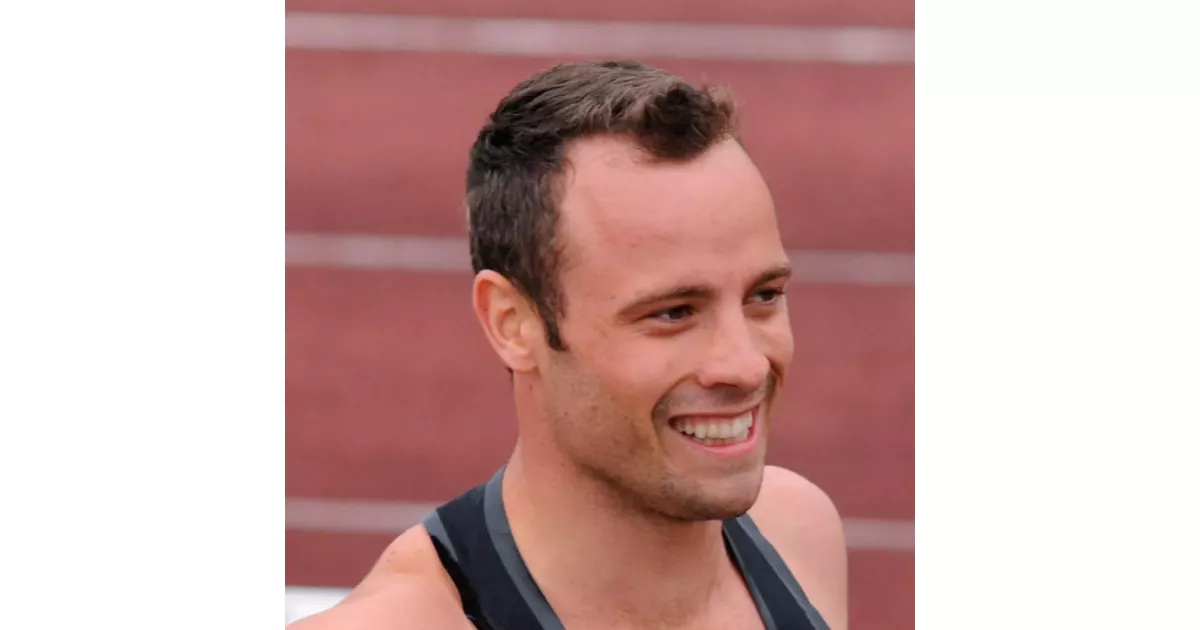Public opinion and media debates around Oscar Pistorius—discover key moments of controversy.
Oscar Pistorius is a South African former professional sprinter who competed in both Paralympic and Olympic Games. He had both legs amputated below the knee as a child. Pistorius' career ended after he was convicted of murdering his girlfriend, Reeva Steenkamp. Initially convicted of culpable homicide, the conviction was later upgraded to murder upon appeal, resulting in a prison sentence.
March 2007: IAAF Rule Amendment
In March 2007, the IAAF amended its competition rules to include a ban on the use of technical devices that provide an unfair advantage, which indirectly affected Oscar Pistorius.
July 2007: IAAF Monitoring
In July 2007, the IAAF monitored Oscar Pistorius' track performances to determine whether his prosthetics gave him an unfair advantage, filming his races in Rome and Sheffield.
November 2007: Scientific Tests in Cologne
In November 2007, Oscar Pistorius underwent scientific tests at the German Sports University Cologne under Professor Peter Brüggemann, commissioned by the IAAF, to assess the energy efficiency of his prosthetic limbs.
December 2007: BBC Sports Award
In December 2007, Oscar Pistorius was awarded the BBC Sports Personality of the Year Helen Rollason Award for outstanding courage and achievement. This award was later revoked after his conviction for murder.
January 2008: IAAF Ineligibility Ruling
In January 2008, based on findings from the tests in Cologne, the IAAF ruled Oscar Pistorius' prostheses ineligible for use in competitions conducted under IAAF rules, including the 2008 Summer Olympic Games.
April 2008: CAS Appeal Hearing
In April 2008, Oscar Pistorius appealed the IAAF's decision to the Court of Arbitration for Sport (CAS) in Lausanne, Switzerland, appearing before the tribunal.
May 2008: CAS Appeal Upheld
In May 2008, CAS upheld Oscar Pistorius' appeal, revoking the IAAF council decision that deemed his prostheses ineligible, allowing him to compete in IAAF competitions.
July 2008: IAAF Concerns and Legal Threats
In July 2008, IAAF general secretary Pierre Weiss expressed concerns about Oscar Pistorius's safety in the 4 × 400 metres relay, leading to Pistorius threatening legal action. The IAAF later clarified it had no objections to his participation.
February 2013: Shooting of Reeva Steenkamp
In February 2013, Oscar Pistorius shot and killed his girlfriend, Reeva Steenkamp, at his home in Pretoria, claiming he mistook her for an intruder. He was arrested and charged with murder.
March 2014: Murder Trial Begins
In March 2014, on March 3rd, Oscar Pistorius's murder trial began at the Pretoria High Court, concerning the shooting of Reeva Steenkamp.
May 2014: Trial Adjournment for Psychiatric Evaluation
In May 2014, on May 20th, the Oscar Pistorius trial was adjourned until June 30th to allow him to undergo psychiatric evaluation to determine his criminal responsibility for the shooting of Reeva Steenkamp.
June 2014: Trial Resumes After Evaluation
In June 2014, on June 30th, Oscar Pistorius's trial resumed after psychiatric evaluation reports indicated he could be held criminally responsible for the shooting of Reeva Steenkamp.
October 2014: Culpable Homicide Conviction
In October 2014, Oscar Pistorius was found not guilty of murder but guilty of culpable homicide in the death of Reeva Steenkamp. He received a five-year prison sentence for culpable homicide and a concurrent three-year suspended sentence for reckless endangerment.
October 2014: Sentencing for Culpable Homicide
In October 2014, on October 21st, Oscar Pistorius was sentenced to a maximum of five years in prison for culpable homicide and received a concurrent three-year suspended sentence for reckless endangerment.
November 2014: Prosecutors apply to appeal culpable homicide verdict
In November 2014, prosecutors applied to the sentencing judge for permission to appeal the culpable homicide verdict, stating that the five-year prison term was "shockingly light, inappropriate and would not have been imposed by any reasonable court".
December 2014: Judge rules prosecution can challenge ruling
In December 2014, Judge Thokozile Masipa ruled that the prosecution could challenge her ruling of acquitting Pistorius of premeditated murder and convicting him of the lesser charge of culpable homicide; however she ruled that the state could not appeal the length of the sentence.
February 2015: Honorary Doctorate Revoked
In February 2015, the University of Strathclyde in Glasgow revoked the honorary doctorate they had previously conferred on Oscar Pistorius, following his conviction for culpable homicide.
June 2015: Recommended for Early Release
In June 2015, Oscar Pistorius was recommended for early release from prison, potentially as early as August, after serving a sixth of his sentence.
August 2015: Release to House Arrest Blocked and Then Announced
In August 2015, Oscar Pistorius's release to house arrest, initially set for August 21st, was unexpectedly blocked by South Africa's Justice Minister Michael Masutha, who deemed the parole board's decision "premature".
October 2015: House Arrest and Appeal
In October 2015, Oscar Pistorius was temporarily released on house arrest while his case was presented on appeal regarding his conviction in the Reeva Steenkamp case.
October 2015: Released from Prison
On October 19, 2015, Oscar Pistorius was released from prison.
November 2015: Pistorius found guilty of murder in appeal
On November 3, 2015, the Supreme Court of Appeal overturned Pistorius's culpable homicide conviction and found him guilty of murder in the death of Reeva Steenkamp.
December 2015: Pistorius to remain free on bail under house arrest
On December 8, 2015, it was announced Pistorius would continue to remain free on bail but under house arrest pending his appeal to the Constitutional Court.
2015: Convicted of Murder
In 2015, Oscar Pistorius' athletic career ended when he was convicted of murder for the death of Reeva Steenkamp, after an appeal upgraded his initial conviction of culpable homicide.
March 2016: Pistorius denied right to appeal, sentencing hearing scheduled
On March 3, 2016, it was announced Pistorius had been denied his right to appeal, and would next be due in court on June 13, 2016 to begin a five-day sentencing hearing for the murder conviction.
April 2016: Case referred back to trial court for sentencing hearing
In April 2016, the culpable homicide verdict was replaced with a murder conviction, and the case was referred back to the trial court for a sentencing hearing when it reconvened on April 18, 2016.
June 2016: Pistorius due in court for sentencing hearing
In June 2016, Pistorius was scheduled to appear in court on June 13, 2016 to begin a five-day sentencing hearing for the murder conviction, concluding on June 17, 2016.
June 2016: Sentencing adjourned until July
On June 15, 2016, the sentencing was adjourned by Judge Thokozile Masipa until July 6, 2016.
July 2016: Sentence Extended
In July 2016, Judge Thokozile Masipa extended Oscar Pistorius's sentence to six years following his conviction for the murder of Reeva Steenkamp.
July 2016: Sentencing adjourned until July
In July 2016, the sentencing was adjourned by Judge Thokozile Masipa until July 6, 2016.
July 2016: NPA to appeal 'shockingly lenient' sentence
On July 21, 2016, the National Prosecuting Authority (NPA) confirmed that it would appeal against Judge Thokozile Masipa's "shockingly lenient" 6-year jail sentence.
July 2016: Pistorius sentenced to six years' imprisonment
On July 6, 2016, Judge Thokozile Masipa sentenced Pistorius to six years' imprisonment for murder, rather than her original sentencing of five years' imprisonment for culpable homicide; once again he was incarcerated in the hospital wing at the Kgosi Mampuru II jail.
August 2016: Masipa rejects appeal bid
On August 26, 2016 the bid to appeal the sentence was rejected by Masipa, who said that the NPA had "no reasonable prospect of success" of securing a longer prison sentence for Pistorius.
September 2016: NPA to make fresh bid to extend jail sentence
On September 15, 2016, it was confirmed that the NPA would make a fresh bid to extend Pistorius's jail sentence and would file papers to the SCA on September 16. After this announcement, sources associated with Pistorius's family and the defence team accused Gerrie Nel and the NPA of pursuing a "personal vendetta" against Pistorius.
September 2017: SCA to hear arguments appealing to extend Pistorius's sentence
On September 19, 2017, it was confirmed that the SCA would hear the state's arguments appealing to extend Pistorius's sentence on November 3, 2017, with its final ruling being confirmed on November 24, 2017.
November 2017: SCA to hear arguments appealing to extend Pistorius's sentence
In November 2017, it was confirmed that the SCA would hear the state's arguments appealing to extend Pistorius's sentence on November 3, 2017, with its final ruling being confirmed on November 24, 2017.
November 2017: Pistorius's jail sentence increased to 13 years and five months
On November 24, 2017, the SCA increased Pistorius's jail sentence to 13 years and five months. Prosecutors had argued that the six-year term was too short.
December 2017: Pistorius files papers to appeal increased sentence
On December 19, 2017, it was confirmed that Pistorius had filed papers with the Constitutional Court to appeal the newly increased sentence and have his previous six-year sentence reinstated.
March 2018: Appeal dismissed by the courts
On March 28, 2018 the appeal was dismissed by the courts; Pistorius was not to be eligible for parole until at least 2023.
April 2018: Appeal dismissed by the courts
On April 9, 2018, it was confirmed that on March 28, 2018 the appeal was dismissed by the courts; Pistorius was not to be eligible for parole until at least 2023.
March 2023: Parole denied after hearing
After an additional hearing, parole was again denied on March 31, 2023.
March 2023: Parole board to consider early release for Pistorius
In March 2023 it was announced that a parole board would consider an early release for Pistorius on March 31, despite his serving just half of his sentence. Pistorius' release was opposed by Barry and June Steenkamp, Reeva Steenkamp's parents.
November 2023: Pistorius to be released on parole
On November 24, 2023, it was announced that Pistorius was to be released on parole. Reeva Steenkamp's mother, June Steenkamp, did not oppose his parole.
Mentioned in this timeline

Amazon Prime is a subscription service offering a variety of...
New Zealand is an island country in the southwestern Pacific...

Piers Morgan is a British broadcaster journalist writer and media...
Africa is the second-largest and second-most populous continent comprising of...

Abu Dhabi is the capital city of the United Arab...
Korea is a peninsular region in East Asia comprised of...
Trending
24 minutes ago Trump Backed by 'Angel Families' Amid Immigration Policy Debate and Crime Victim Support

Antonio Gibson is an American professional football running back and kickoff returner currently playing for the New England Patriots in...

24 minutes ago Tom Osborne, legendary Nebraska football coach, born in Hastings on February 23.

24 minutes ago Tony Gonzales Faces Affair Allegations and Calls for Resignation Amid Scandal.

8 months ago Anna Camp and Jade Whipkey debut as a couple at 'Bride Hard' premiere.

25 minutes ago Pacquiao vs. Mayweather: Rematch Agreed for September, Streaming on Netflix
Popular

Jesse Jackson is an American civil rights activist politician and...

Barack Obama the th U S President - was the...

Michael Joseph Jackson the King of Pop was a highly...
The Winter Olympic Games a major international multi-sport event held...

Bernie Sanders is a prominent American politician currently serving as...

Michael Jordan widely considered one of basketball's greatest players significantly...
